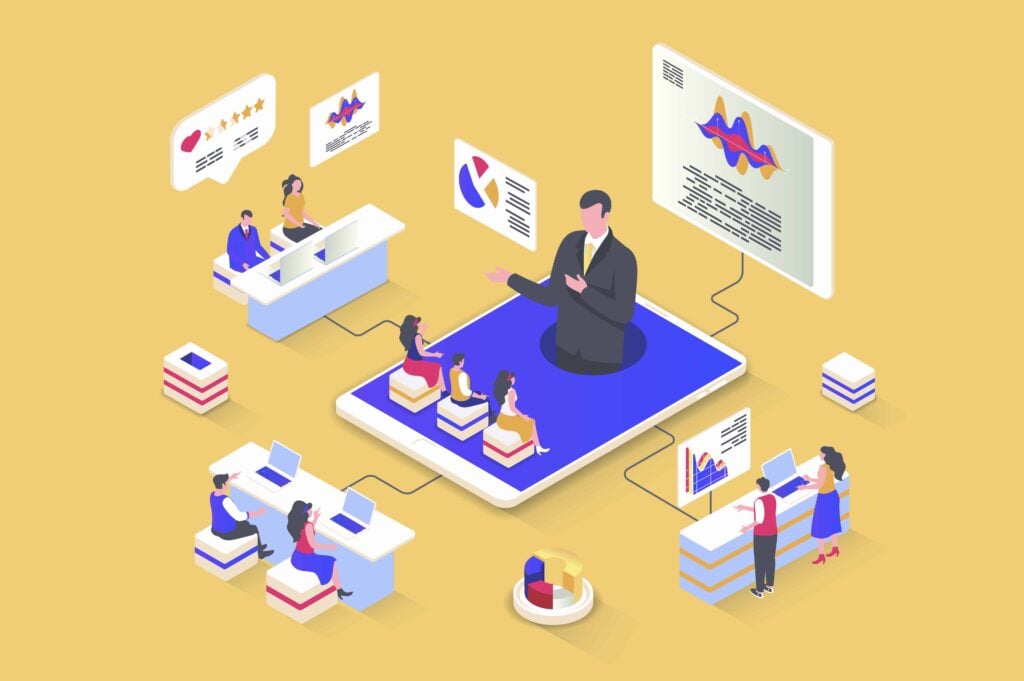How to reduce training costs | 5-step solution for more economical and effective employee training

Are you looking for areas to make operational savings and thinking training is the place to go and make cuts? Read this first! We’ve got an actionable 5-step solution to not only deliver more economical training, but make it more effective too.
The first thing to bear in mind is: more effective training IS more economical training. If your approach to training works, you won’t have to repeat it as often because you won’t need employees to do refreshers, and they’ll be more engaged with their work because they’ll have the tools to do it properly.
1. Assess actual organisational training needs and skills gaps
Start with an audit to identify specific training needs and skill gaps. Understanding the areas where employees require development will help to optimise training programmes and approaches, and avoid putting resources into areas that will offer little return for employees and for the business.
If your business is a small to medium-sized enterprise, this could be a relatively simple exercise, but if your headcount is anywhere from 50 people into the thousands, this will involve meetings with different departments, and a lot of delegation to your HR team.
Pro tip: Easily customise Surveys to your exact needs on the Drimify platform to make your audit company-wide. This will allow you to get a broader understanding of skills and knowledge that you’ll need to be able to easily replicate, and the skills and knowledge that’s currently missing from your organisation.
The anonymity of a Survey means people will be more likely to express what they think needs to be improved skills-wise, as in-person meetings can sometimes be intimidating, and shy employees might keep good suggestions to themselves rather than risk speaking in front of their peers.
2. Create gamified training courses for training resources you can quantitatively analyse and improve
Gamifying your training is an exercise in simultaneously economising and optimising.
First, let’s consider the classic corporate training or upskilling session. For a start it takes someone to administer the training. If this is through an agency, that involves a cost for the service, or if it’s an internal employee, you’ve got their salary every time they deliver a session, and the opportunity cost of whatever else they could be doing. Multiply this by however many sessions they deliver.
You’ve then got to get 10, 20, or even more people’s calendars to match up for a specific time, let’s say it’s an hour. Setting this up creates multiple inefficiencies, and potentially compromises an entire function of your business for that hour. The alternative is an out-of-hours session, which often happens in the service industry. This costs additional wages. Multiply this by however many training sessions you have in a year.
You then need to consider how efficient the training is. Do all these people learn best in this group environment? Is the person delivering the training actually any good? The odds are that some of your employees will hide in the group environment, and some just won’t get as much out of it as others.
Now consider creating a multi-level gamified training course on the same subject. You have your subscription to the gamification platform you build your courses on. A member of staff creates and updates the courses as and when it’s necessary. Then there’s the time each member of staff spends engaging with the content.
That’s kind of it.
You employees can play through the immersive course at times which best serve the business, meaning they can play 2 or 3 at a time, or even at individual times, and no business function is compromised. Everyone gets the same experience out of it, because they all have to individually complete it – no hiding. You also get hard data from user actions to quantify how effective the training’s been.
For multiple topics and longer courses: Check out the Dynamic Path™. This can be accessed and re-accessed by participants just inputting their email address to pick up where they left off in a larger learning journey.
For more straightforward learning outcomes: Check out the Combo™. This also lets you combine games into levels, but players advance directly from game to game. This is ideal for training courses that people will go through in a single sitting, but the multi-game aspect still allows for a more comprehensive grounding in a subject than an individual learning game.
3. Implement peer-to-peer learning and mentor-lines on specific subjects
You can have your employees share their expertise through peer-to-peer learning and mentorship initiatives.
By fostering a collaborative environment, your employees help each other grow, reducing the amount of required external training resources.
In practice, this could involve additional responsibilities for high performers through a mentor-line situation, as well as having new employees shadow more experienced employees, and vice-versa.
4. Foster a learning culture and create an organisation of autodidacts
A great way to reduce your business’s training costs is to foster a learning culture among your people. While this will never eliminate all training costs, it can bring a lot of positivity and new skills to your organisation.
If employees are encouraged to take ownership of their learning journeys, there’s enough information out there that many people can effectively teach themselves knowledge and skills that were formerly gatekept.
Pro tip: So many books of a high quality on business are now in circulation that you could also encourage an internal book club. Titles like Atomic Habits, Turn the Ship Around, and The Chimp Paradox to name a few are all there to help motivated employees level up their approach to work. In a similar vein, autobiographies by famous entrepreneurs and athletes can serve to inspire your people to be better versions of themselves.
5. Continually monitor ongoing training needs and skill gaps within your organisation
Training needs and skill gaps will evolve as your business grows and your industry changes. Regularly reassess the training needs within your organisation, and adjust your training programmes as necessary.
By staying proactive, you can ensure employees are equipped with the right skills at all times.
Pro tip: Institutional or proprietary knowledge disappearing from your business is far more expensive to recoup than to collectively retain it, so look to put in place a knowledge management system to safeguard your business sooner rather than later.
For example, consider a fast food restaurant. The milkshake machine needs cleaning every night, but it’s a relatively technical job, involving taking certain bits apart, putting on the correct internal cleaning cycles, and putting it all back together correctly.
Now imagine you only have one team member who knows how to clean it. While it can take as little as 20 minutes to teach someone else how to do it, imagine if that person left, or was off sick? Suddenly you’re gambling on your available team being able to figure it out, and mistakes could break the machine and incur a costly repair bill.
Key takeaway

Unless you’ve already followed through on our 5-step solution for economising your approach to training, there’s a good chance you can reduce your training costs while still making gains on the efficacy of your approach to upskilling.
Our solution is easy to implement, and adaptable regardless of your industry.

































































































